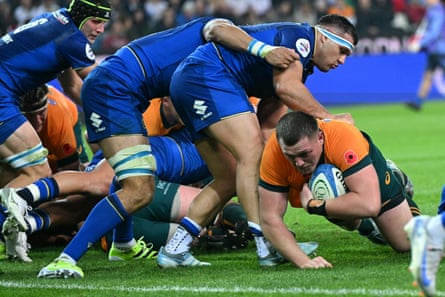Is it better to be a consistently good team or an occasionally brilliant one? We’ll find out by the end of Australia’s European tour. But now, after a 26–19 loss to Italy in Udine – their second defeat in as many matches on this crucial trip – the answer seems obvious. Because despite the Wallabies’ flashes of brilliance throughout the Joe Schmidt era, their inability to deliver steadily could yet prove costly.
At present, the Wallabies are ranked seventh on World Rugby’s charts. If that doesn’t change, the hosts of the 2027 World Cup will be drawn alongside one of the top six teams in the group phase. Even if they progress, Australia would likely face another stiff challenge at the first knockout stage. That’s not the kind of jeopardy a rugby nation of this pedigree should be flirting with.
Anyone who has regularly watched Australia over the past 18 months will be baffled by all of this. They have been magnificent in patches – at times one of the best sides in the world. They were blistering against South Africa in Johannesburg in August, claiming a remarkable 38–22 comeback through slick interplay and bravery with ball in hand. They were equally proficient in the final Test against the British & Irish Lions, grinding out a dogged 22–12 win to deny the tourists a whitewash. They chanced their arm against Argentina in Townsville, turning down kickable points to snatch a stunning 86th-minute victory.
If you only watched the highlights, you’d see a fluent team that spirals the ball wide, attacks the breakdown with fanatic fervour and strikes from first-phase play. When the initial wave dissipates, they show composure and patience, cycling possession as they methodically build towards their goal. This is a good team. A well coached team. A team that knows what it’s about.
But between those famous victories and moments of triumph lie performances that challenge the idea of a renaissance. There was an abject showing against the Lions in the series opener. A shoddy outing against the Springboks in Cape Town. Two predictable implosions against the All Blacks. And a sorry display at a soggy Twickenham against England last week.
One step forward and one step back is better than two steps back, but it’s hardly the stuff of revival. Schmidt’s pragmatic influence has steadied a ship once full of holes, and improved results. He’s also inspired recruitment of talent from rival codes, including the returning Carter Gordon, who scored with a nifty side-step. But is it enough? Are the Wallabies truly back, or merely searching for a previously trodden path?
That depends on what “back” means. Are they World Cup contenders as they were in 1991 and 1999 when they lifted the trophy, or in 2003 and 2015 when they reached the final? No. Not yet. Not even close. So, what are they?

Against Italy they were neither great nor dreadful. They bagged two tries through front-rowers in the first half – Matt Faessler and Angus Bell burrowing over from close range – and largely rectified their sloppiness under the high ball that they showed against England. But the game was a microcosm of their broader malaise: moments of energy offset by costly lapses.
The most tangible of those came just before half-time, when Taniela Tupou collected a pass on the gallop, skipped around a defender, rode another challenge and surged forward. The Wallabies were on the front foot and looking to orchestrate something from unstructured play. Then, inexplicably, the ball spilled forward. Italy countered. The danger passed when Australia won a penalty on the floor soon after, but the sense of frustration lingered. They led 12–9 at the break after 40 minutes of hard graft, but the feeling was of something half-finished, a tune played out of key.
That mood hardened midway through the second half. With Italy leading after Monty Ioane’s try, Australia pressed again. They pounded the line on 68 minutes, phase after phase, bodies piling in. But they were held up over the line; another chance gone. It was the story of the night: plenty of possession, little incision, and no spark of invention beyond one-up runners and short passes around the corner.
after newsletter promotion
When full-time came, it was difficult to know exactly what to make of it. Australia had competed. They had shown intent. But they had not convinced. The outlines of a proper team are there – an improving set-piece, improved defensive structure, a handful of genuine match-winners – yet the brushstrokes remain uneven.
Schmidt has clearly given the Wallabies a plan, but plans need execution, and execution requires habit. The best teams make the extraordinary seem routine; the Wallabies too often make the routine look extraordinary.
So, is it better to be consistently good or occasionally brilliant? Australia remain trapped somewhere in between, capable of beauty, vulnerable to chaos, and still searching for the kind of steady excellence that turns potential into power. Until they find that rhythm, they’ll remain a team of flashes, not finishes.

 2 months ago
42
2 months ago
42

















































